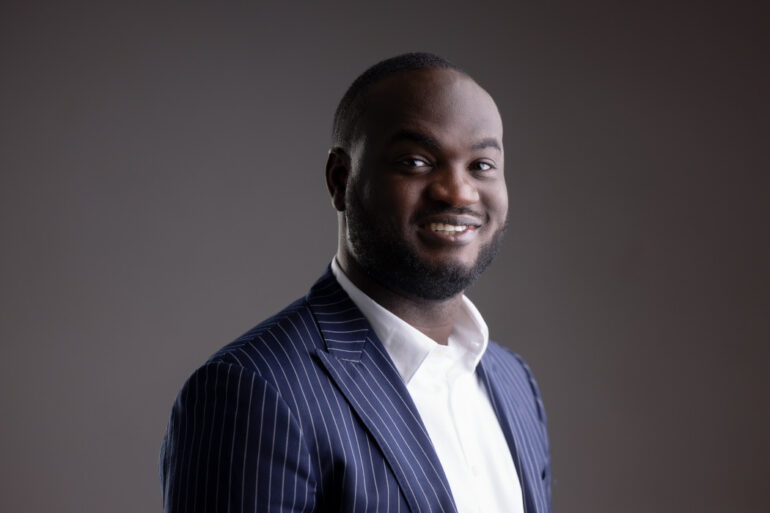After the death of a close family member due to a “medical records mix-up” in his home country of Nigeria, Michael Omidele set out to ensure no other person loses a loved one to the same problem by launching Clinify.
Drawing on his past experience working in healthtech with IBM and Alberta Health Services (AHS), Omidele founded Calgary-based Clinify in 2020 to help digitize and centralize medical records across Africa’s healthcare system and improve patient outcomes.
“This is a solution we should have had by now.”
– Michael Omidele, Clinify
With $2 million CAD ($1.5 million USD) in seed funding from Thin Air Labs, HaloHealth, and Calgary doctors, Clinify began rolling out its electronic medical record (EMR) platform in Africa last fall, starting with Nigeria. Since then, Clinify has deployed its tech with over 10 medical insurance groups, 130 healthcare providers, and 12,000 patients.
“It’s something that’s bigger than me,” Omidele, Clinify’s CEO, told BetaKit in an interview. “It’s something that should have been out there.”
Clinify’s mission is to “digitally centralize health records” and make healthcare services more accessible in Africa. The early-stage startup’s platform aspires to be a “one-stop-shop” that connects a variety of different healthcare industry players and facilitates a range of services, from EMRs, to billing, insurance, and telehealth.
Studies suggest that poor health information is a major challenge facing healthcare systems in many developing countries. Research indicates that this especially true in sub-Saharan Africa—a part of the continent that includes Nigeria, where EMR adoption is low and many records remain paper-based. Given this and Omidele’s personal ties to the country, Clinify has decided to focus its initial efforts on Nigeria.
The company’s equity seed round, which fully closed in September, was led by Calgary’s Thin Air Labs through its first fund. Thin Air Labs provided two-thirds of the $2 million total, with the remainder coming from physician angel group HaloHealth and other undisclosed doctor angels from the Calgary area.
The round gives Clinify a $10 million CAD ($7.5 million USD) post-money valuation, and brings Clinify’s total funding to $2.1 million, including a $100,000 pre-seed round from 2021.
RELATED: Thin Air Labs secures $20 million in initial close of Prairie-focused venture fund
Omidele first came to Calgary in 2010 after his father sold everything to move his family to Canada from Nigeria. Shortly after that, the Clinify founder earned a computer networking engineering degree from DeVry University, obtaining a job with Dell during his studies as an information technology (IT) specialist.
In 2012, Omidele joined IBM as an IT consultant, where he spent three years and helped lead the setup of networking for Calgary’s newest hospital, South Health Campus. Following that, he worked as provincial integration lead with AHS, Alberta’s provincial health authority for nearly seven years. At AHS, he helped implement Epic’s electronic health record (EHR) system into Alberta’s healthcare system.
After experiencing a personal tragedy, Omidele felt a responsibility to apply what he had learned about data and health networks to make medical records more accessible and improve healthcare delivery in not just Nigeria, but across Africa. “It triggered me to just create something that would be beneficial for the continent at large,” said Omidele.
Thin Air Labs managing partner James Lochrie, who has joined Clinify’s board as part of the round, described Omidele as “a mission-driven founder that can see the value he will deliver to millions of people once his vision comes to fruition,” noting that the Clinify founder’s “expertise in the industry and the market are also key elements that give Clinify an unfair advantage.”
RELATED: Doctor-founded Cherry Health closes $1.23 million to expand job-matching platform for physicians
To date, some movement towards EMRs in Africa has been fuelled by a need to respond to infectious diseases. But according to a 2017 paper published in the International Journal of Health Sciences, sub-Saharan Africa still lags behind other regions in terms of EMR adoption.
Research indicates that in Nigeria, today, most health records remain paper-based. As a 2022 paper shared in Frontiers in Digital Health found, “adoption and usage of EMR in developing countries is not common and, in most cases, non-existent,” noting that in Nigeria, the transition towards them has been particularly slow.
“The developed world has been using health platforms like this for decades while most of the African systems rely on outdated practices,” said Lochrie, noting that Clinify’s platform was specifically designed to meet the needs of the local market, while also taking into account its current practices and constraints.
“The developed world has been using health platforms like this for decades while most of the African systems rely on outdated practices.”
– James Lochrie, Thin Air Labs
Omidele spent about two years building Clinify prior to its launch late last year. Since rolling out, the startup has been able to expand its presence by partnering with some of Nigeria’s largest medical insurance groups, or health maintenance organizations.
According to Omidele, this approach has enabled Clinify to move more quickly than one of its more established, unnamed competitors, which has deployed its tech on a site-by-site basis.
Clinify is investing its seed capital in geographic expansion and product development as the company looks to scale up its existing tech infrastructure as well as add more features to its platform. The startup has already used this funding to add 15 employees, bringing its headcount to 20.
According to Omidele, his work with Clinify was also inspired by the impact of what he did with Alberta’s AHS, where he said the EHR system he implemented helped save his dad’s life following a surgery.
“I’ve seen what happens in the healthcare system and [I’ve seen] that same patient lose their lives,” said Omidele, who believes the answer lies in more information. “This is a solution we should have had by now.”
Feature image courtesy Clinify.

